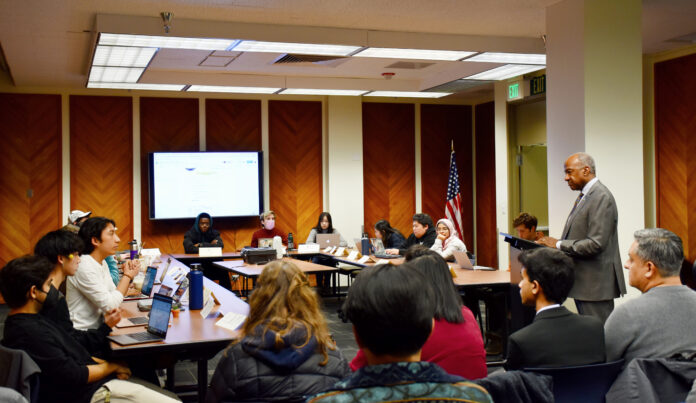He also noted that the UC Davis COVID-19 state of emergency has officially ended
By SONORA SLATER — campus@theaggie.org
At 6:10 p.m. on Tuesday, Feb. 28, Vice President JT Eden called the special session of the Senate to order. He called roll, establishing quorum, and read the UC Davis Land Acknowledgement.
The meeting then moved into a presentation by UC Davis Chancellor Gary May, which was the main purpose of the special session.
May first thanked the Senate for their recent work serving the UC Davis community before diving into his presentation. He began by noting that UC Davis had ended its COVID-19 state of emergency that morning, along with officially ending the campus’s daily symptom survey. He said that free antigen tests are still available at various places on campus, and community members are still encouraged to test if they experience symptoms.
“No one is sad about any of this,” May said, referring to the end of the state of emergency. “The infections continue, but the impact is so much different than it was three years ago.”
He then talked briefly about the collaborative campaign launched in January by UC Davis and the city of Davis known as “Hate-Free Together,” which was launched in response to a series of hate incidents, with the goal of combating discrimination in the Davis community.
May connected this to the larger issue of hate speech being discussed in the Davis community, making a brief statement about the upcoming speaker event hosted UC Davis’s chapter of Turning Point USA (TPUSA); the group’s last speaker event was canceled before the talk began after protests outside turned violent.
“Hate speech is a complicated issue,” May said. “It’s protected under the first amendment — as a public institution, UC Davis is obligated by law to guarantee freedom of speech and expression, which is central to our higher education vision. In dealing with hate speech, I believe our best way forward is not to silence those whose opinions we find offensive but to rebut them, ignore them, condemn the hate and empower with something better.”
Next, May talked about the university’s goal to be designated as a Hispanic-serving institution by next fall, which is defined as a higher education institution with 25% or more total undergraduate Hispanic or Latino student enrollment. According to May, UC Davis currently falls about 300 students short of this designation, with 24.7% Hispanic enrollment. He said that once it earns this designation, the university will be able to apply for certain grants.
The final point of May’s presentation was focused on highlighting plans for the spring commencement ceremonies, which will take place at the Golden 1 Center for the first time.
The floor was then opened to questions.
Senator Priya Talreja asked for an update on the Fossil Fuel Free plan, and May said that a draft report will be available soon for feedback. Senator Gaius Ilupeju asked for May’s help with promoting the upcoming spring ASUCD elections in order to improve voter turnout, and May said he would be happy to collaborate with the Senate table for that purpose.
Fujimoto asked about whether the university is looking to add more on-campus housing, following stories of students lining up overnight at leasing offices to sign a lease.
“There are some activists in the city who want us to do more; they want us to build higher,” May said. “But if you go higher, it’s more expensive, so that’s not the solution we want to go with. We think that if we encourage more construction around the campus to push down prices, that’s probably better.”
Transfer Student Representative Logan Ueno also asked about housing. Ueno specifically asked about a proposal to change the leasing period at The Green to just during the school year as opposed to a 12-month period.
Vice Chancellor for Student Affairs Pablo Reguerín, who was present at the meeting in the audience, said that the price point per month will increase because of this change, but that it is being proposed to better align the time when rent is due to when financial aid applies, and therefore decrease the net cost to students. In response to follow-up questions, he added that they will have “summer school housing” available and will work with reentry students or others who stay on campus over the summer on a case-by-case basis.
External Vice President Celene Aridin asked May if the university is planning to turn the ARC into an on-campus voting center again for upcoming elections, and he said that they are. She also expressed complaints about the slow voting process at these centers, to which he said that he is happy to work with the county to try to make things more efficient this year.
Next, May answered a question about the TPUSA event coming up, saying that while he of course supports protests on campus, there are also alternative forms of expressing disagreement with the organization’s views that students can take advantage of.
“I think it will be a very effective and compelling message if that speaker comes and speaks to an empty room,” May said. “Nothing would please me more.”
Reguerín added that ASUCD could hold hlding alternative programming on the same day and time as the speaker event.
“One approach is to have more expression, more voice, so for me, holding an alternative event is a phenomenal way to do it,” Reguerín said.
May concluded his presentation and left the room. The Senate removed the quarterly reports planned for that night from the agenda and adjourned at 6:51 p.m.
Written by: Sonora Slater — campus@theaggie.org










